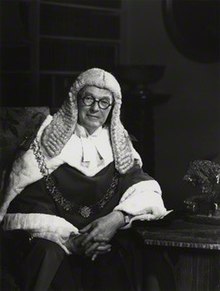- 1 2 3 4 5 6 D. A. S. Cairns, 'Parker, Hubert Lister, Baron Parker of Waddington (1900–1972)', rev. Robert Stevens, Oxford Dictionary of National Biography, Oxford University Press, 2004; online edn, May 2006, accessed 15 Feb 2010.
- 1 2 3 "Lord Parker of Waddington" (obituary), The Times, 16 September 1972, p. 14.
- ↑ "No. 41511". The London Gazette . 30 September 1958. p. 5973.
- ↑ "Officials And The Rule Of Law", The Times, 29 June 1960, p. 8.
- ↑ "Parker of Waddington, Baron (Law Lord) (UK, 1913 - 1918)".
The Lord Parker of Waddington | |
|---|---|
 1968 photograph, by Godfrey Argent | |
| Lord Chief Justice of England | |
| In office 30 September 1958 –19 April 1971 |